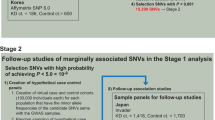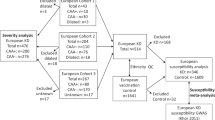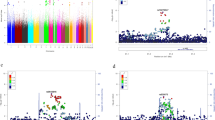Abstract
Kawasaki disease (KD) is a systemic vasculitis associated with cardiovascular symptom. A previous study in the European descent has indicated that genetic variants of the transforming growth factor-β (TGF-β) pathway are involved in the KD susceptibility and clinical status. This study was conducted to investigate if polymorphisms in TGF-β signaling pathway are associated with KD susceptibility, and the coronary artery lesion formation. A total of 950 subjects (381 KD patients and 569 controls) were investigated to identify 12 single-nucleotide polymorphisms in the TGF-β signaling pathway (rs2796817, rs10482751, rs2027567, rs12029576, rs11466480, rs4776338, rs12901071, rs7162912, rs1438386, rs6494633, rs12910698 and rs4776339) by using TaqMan Allelic Discrimination assay. Our results indicated that rs1438386 in the SMAD3 is significantly associated with the susceptibility of KD. Additionally, both haplotypes of TGFβ2 and SMAD3 were also associated with the risk of KD. This study showed that genetic polymorphisms in TGF-β signaling pathway are associated with KD susceptibility, but not coronary artery lesions formation, or intravenous immunoglobulin treatment response in the Taiwanese population.
Similar content being viewed by others
Log in or create a free account to read this content
Gain free access to this article, as well as selected content from this journal and more on nature.com
or
References
Kawasaki, T., Kosaki, F., Okawa, S., Shigematsu, I. & Yanagawa, H. A new infantile acute febrile mucocutaneous lymph node syndrome (MLNS) prevailing in Japan. Pediatrics 54, 271–276 (1974).
Wang, C. L., Wu, Y. T., Liu, C. A., Kuo, H. C. & Yang, K. D. Kawasaki disease: infection, immunity and genetics. Pediatr. Infect. Dis. J. 24, 998–1004 (2005).
Burns, J. C. & Glode, M. P. Kawasaki syndrome. Lancet 364, 533–544 (2004).
Kuo, H. C., Liang, C. D., Wang, C. L., Yu, H. R., Hwang, K. P. & Yang, K. D. Serum albumin level predicts initial intravenous immunoglobulin treatment failure in Kawasaki disease. Acta Paediatr. 99, 1578–1583 (2010).
Park, Y. W., Han, J. W., Park, I. S., Kim, C. H., Cha, S. H., Ma, J. S. et al. Kawasaki disease in Korea, 2003–2005. Pediatr. Infect. Dis. J. 26, 821–823 (2007).
Huang, W. C., Huang, L. M., Chang, I. S., Chang, L. Y., Chiang, B. L., Chen, P. J. et al. Epidemiologic features of Kawasaki disease in Taiwan, 2003–2006. Pediatrics 123, e401–e405 (2009).
Nakamura, Y., Yashiro, M., Uehara, R., Oki, I., Kayaba, K. & Yanagawa, H. Increasing incidence of Kawasaki disease in Japan: nationwide survey. Pediatr. Int. 50, 287–290 (2008).
Liang, C. D., Kuo, H. C., Yang, K. D., Wang, C. L. & Ko, S. F. Coronary artery fistula associated with Kawasaki disease. Am. Heart J. 157, 584–588 (2009).
Newburger, J. W., Takahashi, M., Gerber, M. A., Gewitz, M. H., Tani, L. Y., Burns, J. C. et al. Diagnosis, treatment, and long-term management of Kawasaki disease: a statement for health professionals from the Committee on Rheumatic Fever, Endocarditis and Kawasaki Disease, Council on Cardiovascular Disease in the Young, American Heart Association. Circulation 110, 2747–2771 (2004).
Jibiki, T., Terai, M., Shima, M., Ogawa, A., Hamada, H., Kanazawa, M. et al. Monocyte chemoattractant protein 1 gene regulatory region polymorphism and serum levels of monocyte chemoattractant protein 1 in Japanese patients with Kawasaki disease. Arthritis Rheum. 44, 2211–2212 (2001).
Weng, K. P., Hsieh, K. S., Hwang, Y. T., Huang, S. H., Lai, T. J., Yuh, Y. S. et al. IL-10 polymorphisms are associated with coronary artery lesions in acute stage of Kawasaki disease. Circ. J. 74, 983–989 (2010).
Onouchi, Y., Onoue, S., Tamari, M., Wakui, K., Fukushima, Y., Yashiro, M. et al. CD40 ligand gene and Kawasaki disease. Eur. J. Hum. Genet. 12, 1062–1068 (2004).
Burns, J. C., Shimizu, C., Shike, H., Newburger, J. W., Sundel, R. P., Baker, A. L. et al. Family-based association analysis implicates IL-4 in susceptibility to Kawasaki disease. Genes Immun. 6, 438–444 (2005).
Onouchi, Y., Ozaki, K., Buns, J. C., Shimizu, C., Hamada, H., Honda, T. et al. Common variants in CASP3 confer susceptibility to Kawasaki disease. Hum. Mol. Genet. 19, 2898–2906 (2010).
Kuo, H. C., Yu, H. R., Juo, S. H., Yang, K. D., Wang, Y. S., Liang, C. D. et al. CASP3 gene single-nucleotide polymorphism (rs72689236) and Kawasaki disease in Taiwanese children. J. Hum. Genet. 56, 161–165 (2011).
Chen, S. Y., Wan, L., Huang, Y. C., Sheu, J. J., Lan, Y. C., Lai, C. H. et al. Interleukin-18 gene 105A/C genetic polymorphism is associated with the susceptibility of Kawasaki disease. J. Clin. Lab. Anal. 23, 71–76 (2009).
Lin, Y. J., Wan, L., Wu, J. Y., Sheu, J. J., Lin, C. W., Lan, Y. C. et al. HLA-E gene polymorphism associated with susceptibility to Kawasaki disease and formation of coronary artery aneurysms. Arthritis Rheum. 60, 604–610 (2009).
Jhang, W. K., Kang, M. J., Jin, H. S., Yu, J., Kim, B. J., Kim, B. S. et al. The CCR5 (-2135C/T) polymorphism may be associated with the development of Kawasaki disease in Korean children. J. Clin. Immunol. 29, 22–28 (2009).
Kuo, H. C., Yang, K. D., Juo, S. H., Liang, C. D., Chen, W. C., Wang, Y. S. et al. ITPKC single nucleotide polymorphism associated with the Kawasaki disease in a Taiwanese population. PloS. One 6, e17370 (2011).
Onouchi, Y., Gunji, T., Burns, J. C., Shimizu, C., Newburger, J. W., Yashiro, M. et al. ITPKC functional polymorphism associated with Kawasaki disease susceptibility and formation of coronary artery aneurysms. Nat. Genet. 40, 35–42 (2008).
Burgner, D., Davila, S., Breunis, W. B., Ng, S. B., Li, Y., Bonnard, C. et al. A genome-wide association study identifies novel and functionally related susceptibility loci for Kawasaki disease. PloS. Genet. 5, e1000319 (2009).
Shimizu, C., Jain, S., Davila, S., Hibberd, M. L., Lin, K. O., Molkara, D. et al. Transforming growth factor-beta signaling pathway in patients with Kawasaki disease. Circ. Cardiovasc. Genet. 4, 16–25 (2011).
Taylor, A. W. Review of the activation of TGF-beta in immunity. J. Leukoc. Biol. 85, 29–33 (2009).
Christ, M., McCartney-Francis, N. L., Kulkarni, A. B., Ward, J. M., Mizel, D. E., Mackall, C. L. et al. Immune dysregulation in TGF-beta 1-deficient mice. J. Immunol. 153, 1936–1946 (1994).
Leask, A. & Abraham, D. J. TGF-beta signaling and the fibrotic response. FASEB J. 18, 816–827 (2004).
Chen, C. L., Liu, I. H., Fliesler, S. J., Han, X., Huang, S. S. & Huang, J. S. Cholesterol suppresses cellular TGF-beta responsiveness: implications in atherogenesis. J. Cell Sci. 120, 3509–3521 (2007).
Kuo, H. C., Liang, C. D., Yu, H. R., Wang, C. L., Lin, I. C., Liu, C. A. et al. CTLA-4, position 49 A/G polymorphism associated with coronary artery lesions in Kawasaki disease. J. Clin. Immunol. 31, 240–244 (2010).
Kuo, H. C., Wang, C. L., Liang, C. D., Yu, H. R., Huang, C. F., Wang, L. et al. Association of lower eosinophil-related T helper 2 (Th2) cytokines with coronary artery lesions in Kawasaki disease. Pediatr. Allergy Immunol. 20, 266–272 (2009).
Yu, H. R., Kuo, H. C., Sheen, J. M., Wang, L., Lin, I. C., Wang, C. L. et al. A unique plasma proteomic profiling with imbalanced fibrinogen cascade in patients with Kawasaki disease. Pediatr. Allergy Immunol. 20, 699–707 (2009).
Shulman, S. T., De Inocencio, J. & Hirsch, R. Kawasaki disease. Pediatr. Clin. North Am. 42, 1205–1222 (1995).
Kuo, H. C., Wang, C. L., Liang, C. D., Yu, H. R., Chen, H. H., Wang, L. et al. Persistent monocytosis after intravenous immunoglobulin therapy correlated with the development of coronary artery lesions in patients with Kawasaki disease. J. Microbiol. Immunol. Infect. 40, 395–400 (2007).
Kuo, H. C., Yang, K. D., Liang, C. D., Bong, C. N., Yu, H. R., Wang, L. et al. The relationship of eosinophilia to intravenous immunoglobulin treatment failure in Kawasaki disease. Pediatr. Allergy Immunol. 18, 354–359 (2007).
Das, L. & Levine, A. D. TGF-beta inhibits IL-2 production and promotes cell cycle arrest in TCR-activated effector/memory T cells in the presence of sustained TCR signal transduction. J. Immunol. 180, 1490–1498 (2008).
Kim, J. J., Hong, Y. M., Sohn, S., Jang, G. Y., Ha, K. S., Yun, S. W. et al. A genome-wide association analysis reveals 1p31 and 2p13.3 as susceptibility loci for Kawasaki disease. Hum. Genet. 129, 487–495 (2011).
Tsai, F. J., Lee, Y. C., Chang, J. S., Huang, L. M., Huang, F. Y., Chiu, N. C. et al. Identification of novel susceptibility loci for Kawasaki disease in a Han Chinese population by a genome-wide association study. PloS. One 6, e16853 (2011).
Acknowledgements
This study was partly supported by funding from Excellence for Cancer Research Center grant, Department of Health, Executive Yuan, Taiwan, ROC (NO.DOH100-TD-C-111-002). This work was supported by a grant from the National Science Council, Taiwan, ROC (NSC 100-2320-B-037-002) to WCChang. This work was supported by a grant from Chang Gung Memorial Hospital, Taiwan (CMRPG891441, CMRPG891241 and CMRP8A0121). I am grateful to Edward Hsi (Kaohsiung Medical University Hospital) for providing valuable suggestions in this study.
Author information
Authors and Affiliations
Corresponding author
Ethics declarations
Competing interests
The authors declare no conflict of interest.
Rights and permissions
About this article
Cite this article
Kuo, HC., Onouchi, Y., Hsu, YW. et al. Polymorphisms of transforming growth factor-β signaling pathway and Kawasaki disease in the Taiwanese population. J Hum Genet 56, 840–845 (2011). https://doi.org/10.1038/jhg.2011.113
Received:
Revised:
Accepted:
Published:
Issue date:
DOI: https://doi.org/10.1038/jhg.2011.113
Keywords
This article is cited by
-
Predictive model based on gene and laboratory data for intravenous immunoglobulin resistance in Kawasaki disease in a Chinese population
Pediatric Rheumatology (2021)
-
Immunogenetics of Kawasaki disease
Clinical Reviews in Allergy & Immunology (2020)
-
Dissecting Kawasaki disease: a state-of-the-art review
European Journal of Pediatrics (2017)
-
Major methylation alterations on the CpG markers of inflammatory immune associated genes after IVIG treatment in Kawasaki disease
BMC Medical Genomics (2016)
-
Genetic variants of ADAM17 are implicated in the pathological process of Kawasaki disease and secondary coronary artery lesions via the TGF-β/SMAD3 signaling pathway
European Journal of Pediatrics (2016)



